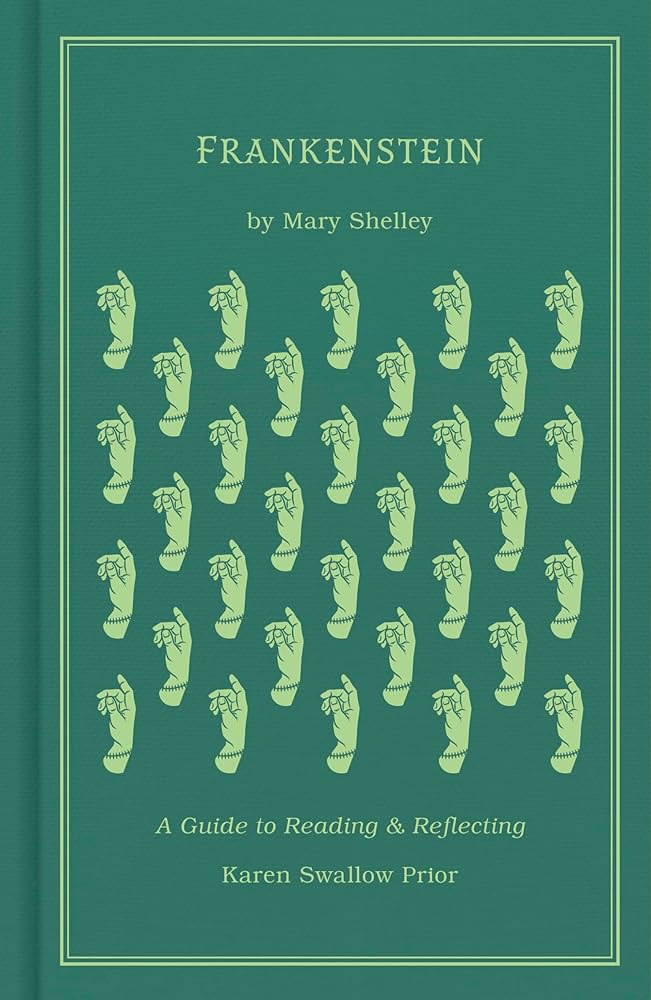Frankenstein by Mary Shelley
A formational book review by Megan
4.5/5 stars

“I had desired it [creating a being] with an ardour that far exceeded moderation; but now that I had finished; the beauty of the dream vanished; and breathless horror and disgust filled my heart.”
Many people through out the world know about Frankenstein, Hollywood has given much attention to this tale of terror but fewer people actually read the book and know that Frankenstein is actually the name of the scientist who creates the monster, not the other way around.
Lance and I both read this book along with two of our friends here in Port Townsend. We recently got together to discuss the book so this book review will not follow the usual format.
I read the 1818 Frankenstein version that includes notes and discussion questions from Karen Swallow Prior, a Christian professor of literature and author of multiple books, she even added in the book a section titled “Reading Frankenstein as a Christian Today.”
Background
Mary Shelley was born in 1797 England to two revolutionary authors who did not believe in marriage but only married after they were expecting Mary and knew that their daughter would be at a disadvantage if the did not marry. Mary grew up outside the typical family boundaries, she had multiple half siblings from her parent’s illegitimate relationships and because of this she followed their idea of “free love” and ran away with author Percy Shelley (who was already married) along with her half-sister. Sadly, Mary endured the deaths of four of her children through miscarriages or premature death along with the suicide of a sister and Percy’s wife and eventually her lover. She was surrounded by death.
Unofficial Thoughts from the Unofficial DB Book Club
“I don’t like Frankenstein,” says Rachel. She is referring to Victor Frankenstein and his obsession for glory and prestige.
Rachel interjected this opinion as we compared the visions of glory sought by Victor Frankenstein and Paul in 2 Corinthians 12. Paul states that he will only boast of his weaknesses because through them Christ is glorified. Frankenstein set out to create his monster for his own glory, for the triumph of creating.
“A new species would bless me as its creator and source; many happy and excellent natures would owe their being to me. No father could claim the gratitude of his child so completely as I should deserve theirs.”
Compare that quote with Paul in 2 Corinthians 12:9 “But he said to me, ‘My grace is sufficient for you, for my power is made perfect in weakness.’ Therefore I will boast all the more gladly about my weaknesses, so that Christ’s power may rest on me.
We moved on to discuss the question, what truths does the novel convey about human beings as social creatures?
God created us for community, he desired to be with His creation while Frankenstein created for his own glory and once he created his monster, he wanted nothing to do with it. The monster continued to seek out fellowship and community, he desired relationship and acceptance which is what drove him to demand a mate from Frankenstein.
“but my form is a filthy type of yours, more horrid from its very resemblance. Satan had his companions, fellow-devils, to admire and encourage him; but I am solitary and detested.”
The monster was rejected by mankind and forced to live a solitary life and in his anguish he cultivated hatred and a desire for revenge. In the introduction, Prior discusses the importance of companionship and friendship and that perhaps the church today has replaced this idea with “mentors” or “accountability partners” instead of helping people find healthy “companionship in our lives and as well as the dangers of not having good friends.”
“I don’t like Frankenstein,” repeats Rachel.
Nature versus nurture is another great topic to discuss in view of the book. Was Frankenstein’s creature destined to be a monster in character or was that nurtured by the rejection of society and his Creator? Multiple times the monster begs his creator to take pity on him as his creation but his request falls on deaf ears. It can also be discussed that if we are created in the image of God, what was the monster created in the image of and does that bear on his character?
“Slave, I before reasoned with you, but you have proved yourself unworthy of my condescension. Remember that I have power; you believe yourself miserable, but I can make you so wretched that the light of day will be hateful to you. You are my creator, but I am your master;- obey!”
“Did I mention I don’t like Frankenstein?” asks Rachel.
Final Thoughts
“Living as we do in a culture that increasingly questions the goodness (or even the existence) of a God who created a world and to whom we are subject renders this two-hundred-year-old novel more timely than ever.”
Karen Swallow Prior
Read Frankenstein as soon as possible, there is much to unpack and contemplate.